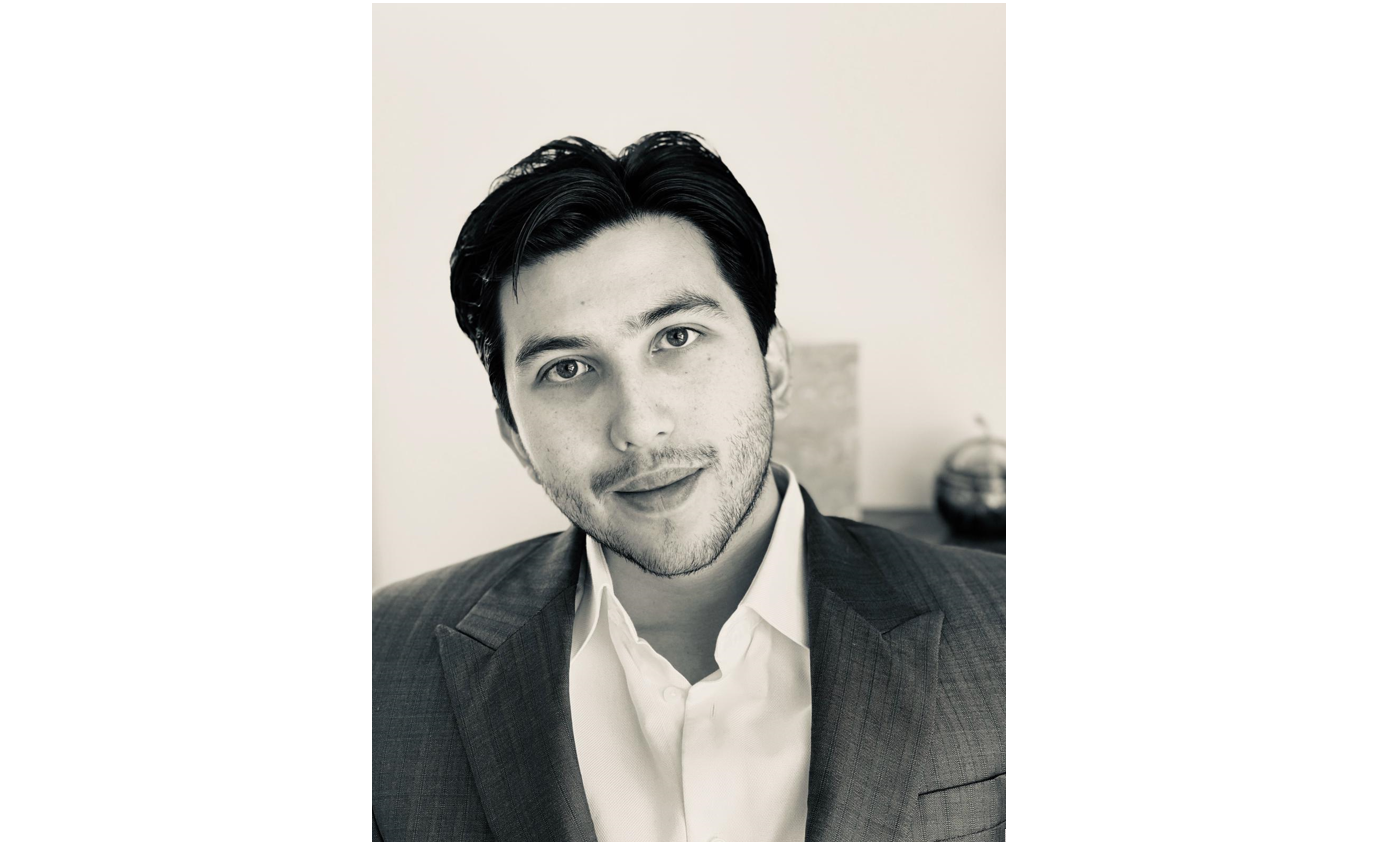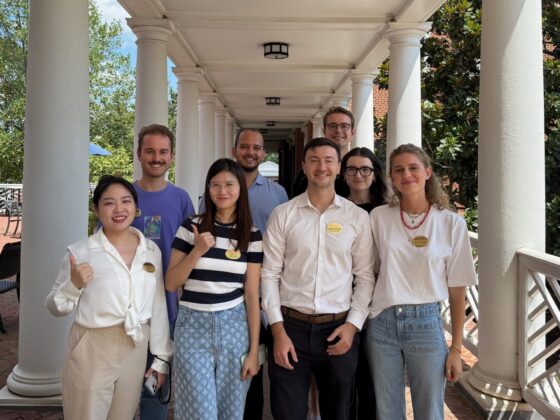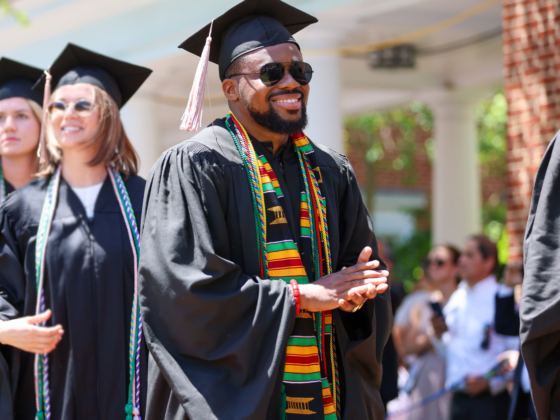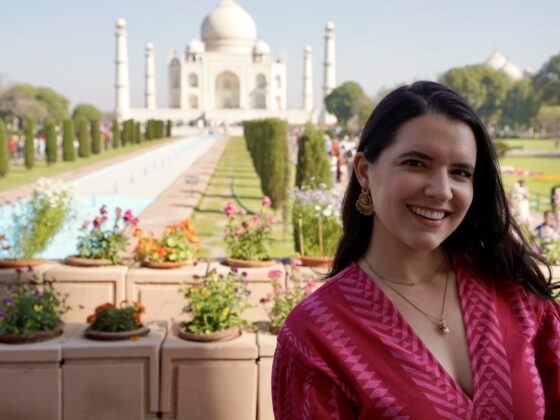Clement Le Royer (Class of 2020) is the outgoing president of the Asia Business Club at Darden and will graduate from Darden this upcoming weekend. Before graduation, Clement took some time to share with us his global experiences at Darden and his plans for what comes next. Clement shared:
Please tell us a little about your background.
I grew up traveling the world with my multinational family. My father is Swiss and French and my mother is Taiwanese, and they met when they were studying in the U.S. at the same time. Partly due to my dad’s work in international business development, I lived in three continents and nine countries all before I came to Darden. I knew I wanted to do my undergraduate degree in a country I had never lived in before, so I attended Lancaster University in northern England where I studied management and entrepreneurship. As a part of my undergraduate degree, I spent a year in mainland China, splitting my time working for Nestle in Beijing and a government-owned company in Suzhou. This experience pushed me out of my comfort zone, where I grew and gained new perspectives on business and life. During the year I spent in China, I knew I wanted to start my career by working in Asia.
After undergrad, I started my entrepreneurial journey in Hong Kong by partnering with an experienced pharmacist in Switzerland to start an herbal-based health supplement company. For four years, I worked on creating the brand, developing and implementing a marketing plan, selling to distributors, and managing the supply chain side of our business while my partner focused on the manufacturing side. The changing market in Hong Kong and China prevented us from reaching the next stage of growth, as we weren’t hitting the growth milestones we needed to from our investors’ perspectives. Though I wanted to take my time to really build out the company and navigate the changing market, the reality was we couldn’t run a profitable business. Closing that business was hard, but after coming to Darden, I could make better sense of the realities that were out of our control. Business school enabled me to look back and rationalize the lessons I learned from my startup experience, and allowed me to turn a new page in my life story.
What led you to attend Darden?
Getting an MBA was always on my bucket list, and especially after my startup experience, I knew it would be a great way to fast track learning and gain access to a valuable network of alumni around the world. Darden’s case method pedagogy was a definite appeal, as well as the small town atmosphere of Charlottesville. Beyond that, I heard about Darden professors’ personalized approach from several alumni. They shared how Darden professors have an open door policy where students can go to their office at any time to answer questions and that they help you emotionally get through some of the most rigorous parts of the MBA experience. Darden professors truly care about their students on a personal level. The Darden network proved just as valuable as I heard. While recruiting for consulting in my second year, I reached out to various people in that domain – peers, alumni, etc. – and everyone was always willing to help and were generous with their time.
Why did you choose to participate in the Brazil Darden Worldwide Course (DWC)? Could you share one or two key takeaways from the DWC?
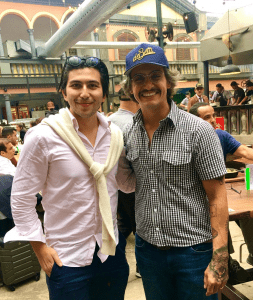
I chose to attend the DWC in Brazil because I had never traveled to Brazil before and was not familiar with Latin American cultures or business. Given my relative proximity to Brazil while living in the U.S. as compared with Europe or Asia, now felt like the perfect time to visit Latin America. The course contained a wonderful schedule of events, including visits with local politicians and corporate leaders. I knew this would be an all-around educational experience and that I would learn more about the country than if I were to travel to Brazil on my own. Of all the lessons I took away from the DWC, three companies we visited and leaders we heard from had particular anecdotes and experiences which have been engrained in my mind:
- Nubank: Brazil faces some of the largest contrasts between people that I have ever seen. These challenges are highly contextualized, and Nubank’s success is directly related confronting the pain points presented by these uniquely Brazilian challenges. Nubank is Latin America’s largest fintech startup based in Sao Paulo, Brazil. With Sao Paulo’s high crime rate, banks oftentimes implement barriers and security measures that create suboptimal and intimidating experiences in bank branches. Brazil’s interest rates are also amongst the highest in the world, and bank branches are open only six hours a day- while a typical visit usually takes over an hour. In a country where there is significant lack of access to credit cards and bank accounts, Nubank filled the gap by becoming an app-based virtual bank where you can create a bank account and receive a virtual credit card without ever having to pass through a bank branch. On top of that, all money deposited there yields risk free rates of return from day one.
- DeBetti Dry Aged: Rogerio Betti is the owner of DeBetti’s butchery and steakhouse chains in Sao Paulo. Contrary to popular belief, it is actually quite hard to find good quality steak in Sao Paulo because most meat cuts are primed for export. For example, in both the U.S. and Hong Kong, quality beef from Brazil is abundant due to a willingness to pay a higher price. Rogerio looked at Brazil’s meat market, which focused on quantity over quality, and decided to start a premium steakhouse and butcher shop in Sao Paulo focused on keeping and selling quality cuts in Brazil. He is a phenomenal and inspiring entrepreneur who shared some fascinating stories with us during our visit to his steakhouse.
- Natura: Oftentimes, conservation and economic growth are at odds. Our visit to Natura, Brazil’s largest cosmetics manufacturer, showed us how these two principles could be compatible. Natura is an astoundingly successful example of how businesses can be green and create value for stakeholders as well as the environment. Natura continues to donate a lot of its profit into forest conservation and put jobs back into communities in Brazil. At the time we visited, Natura had saved over 250,000 hectares of the Amazon rainforest and developed sustainable practices for indigenous communities who live in or nearby the forest.
How did you get involved with the Asia Business Club at Darden (ABCD)?
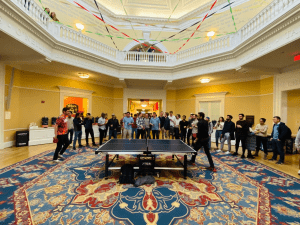
My first experience with ABCD was Asia Week in 2019, during which I attended various events that promoted the diversity of Asia. Asia spans from Japan to Turkey, so there is a lot of ground to cover in terms of representing the multiple facets of the continent. And yet, despite being one of the most diverse continents in the world, people have the tendency to think of it as a homogenous place. I saw a great need to continue to promote and present Asian diversity, even within the ABCD board, and so as ABCD president in my second year, I reached out to peers who were not as active in the club and asked them if they would highlight their cultures through different events. During my time as club president, ABCD co-sponsored two Globetrotters events in conjunction with the Global Business and Culture Club (GBCC), showcasing Taiwan and Kazakhstan. In Asia, there are so many different cultures under one umbrella, and ABCD offers a free learning platform through which to dig into these cultures.
Why is cultural diversity and promoting Asian culture important to you from a business standpoint?
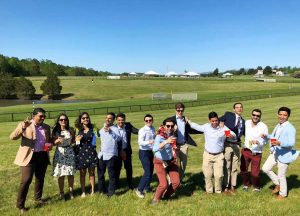
We live in an interconnected world now where circumstances on one side of the planet will impact jobs and businesses on the other side. From a business perspective, leaders must be aware of cultural differences, tensions, and challenges to be able to address them appropriately. Anyone who looks at the news nowadays knows that there is a lot of movement in the Asian business scene: distribution and supply chains are changing, the West is scrambling to get accurate information with which to make decisions; and political tensions between the East and West are shifting all the time. It is essential for leaders to understand the cultural nuances and contexts of business around the world to perform in an ever-changing international business environment.
What are your plans for after graduation?
I accepted a position in London, U.K. with ZS Associates, a consulting firm with special focus on healthcare. Given everything happening with COVID-19, I should have an interesting summer ahead of me as I enter the industry. Since my undergraduate years, I have wanted to go into the healthcare sector as I believe it offers a meaningful career in a field that will always deliver positive impact for the world.

